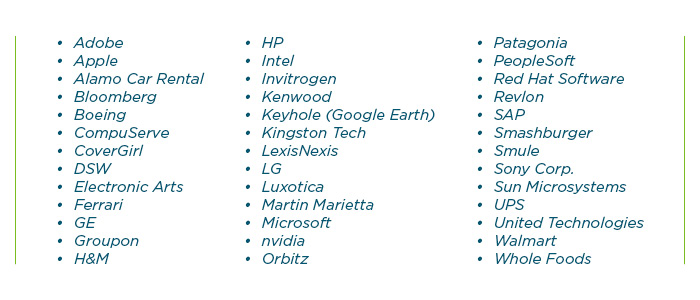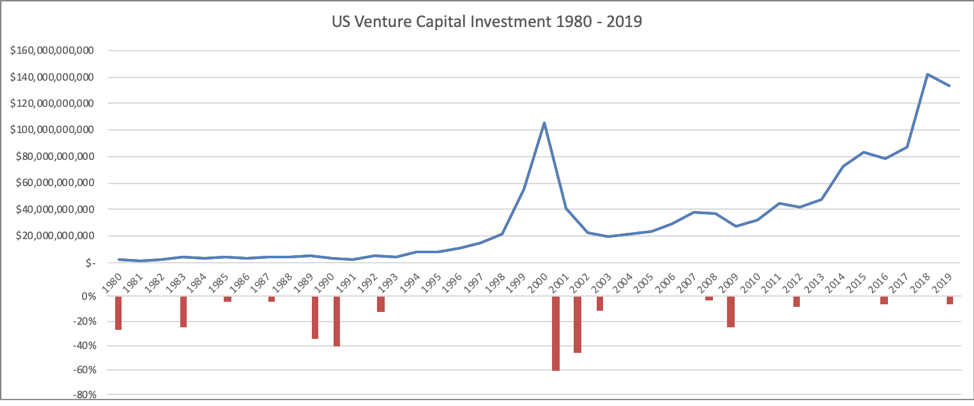Powerful Reasons to Launch a Startup in a Recession
It’s generally accepted that the U.S. is now in a recession after one of the longest bull markets in our history. What does this mean for entrepreneurs and their startups? The first significant effect is a capital retreat.
The last decade saw venture capital investment increase nearly 700 percent from $20B in 2008 to over $136B in 2019. The last time VC investment exceeded $100B was in 2000 in a lead up to the dot com crash that saw VC investment decline over 60 percent in one year, ultimately bottoming out at $19B in 2004.
Capital retreat takes several forms.
- There is a general decline in available capital as investors evaluate their strategies and priorities. CB Insights projects that we could see a 20+ percent decrease in seed-stage financings this year. Seed-stage capital is almost always most severely hit because investors want to preserve capital to optimize prospects for higher returns for current investment funds. Consequently, they will focus on supporting high-performing portfolio companies and make their new investments in later-stage companies to lower their risk.
- There is a geographic effect of capital retreat. During strong markets, investors from high-concentration markets such as Silicon Valley and the Northeast (which typically consume 70 percent of all U.S. venture investment) begin looking farther afield for investment opportunities as competition locally has decreased selection. When a recession starts, those investors generally go back home where most of their portfolio companies are located, where they have the best networks, and as a way to reduce their cost structure.
- For entrepreneurs who can raise capital, some recessionary effects may seem pernicious. Investors must match return expectations they provided their investors with risk-adjusted realities. Because investors have become suddenly highly risk-sensitive, investors will generally offer term sheets at lower valuation step-ups, or possibly at no step-up from the prior round. In addition, the terms for such investments will take a noticeable shift to “investor friendly” terms versus the “entrepreneur friendly” terms seen during more frothy times.
- Each investor will almost certainly have some portfolio companies that will not survive the market adjustment that otherwise might have survived. These real or potential losses are quickly calculated into a venture firm’s return projections. VCs in the firm then make adjustments to any new investments to compensate for potential losses.
However, just because the markets have adjusted, and many entrepreneurs are running for cover doesn’t mean everyone else should, too. In fact, this may be precisely the right time to start a new venture.
Here are five good reasons to launch a startup in the current climate.
- Others have gone before you leading the way. Founders have launched many well-known companies (see the list below) in down markets. These companies represent consumer brands, technology companies, and service businesses. You can surely find a role model in your sector.
Notable companies founded during recessions:

2. If your company sells to other businesses (B2B), the shakeouts in specific market sectors usually happens rather quickly. Firms with shaky foundations either fold, are acquired, or climb into the bunker. Don’t waste your time; shaky firms aren’t the customers you want. Stronger companies will soon reassess their markets and begin seeking out every competitive advantage they can find.
If you answer “yes” to any of these questions, you could be the company that these types of business are looking for:
Will your product or service help the customer achieve a competitive edge?
Can you demonstrate those features and the value proposition clearly and concisely?
Is your solution cost-competitive compared to the status quo and other competitors?
One caveat: The beginning of a down market is one of the very few times that companies will carefully evaluate a product that can legitimately save them money. Before making claims, you better know more about your customers’ business than they do and the specifics of how your solution can help them reduce expenditures.
3. More than ever, companies built on solid fundamentals, such as low operating margins, relatively high-profit margins, long cash runways, and tightly controlled operating expenses have an advantage in down markets. If your business was not profitable before, can you make it profitable now? If you don’t need to raise capital, don’t. If you must raise capital, is your product in the market? Do you have enthusiastic, referencable customers? If not, can you scale back spending to achieve at least a twelve-month runway?
4. Recessions force customers to think about their business operations, critical needs, and competitive alternatives to the suppliers they have been using. When markets are the most active, many buyers and users are too busy making sales to their own customers and don’t have the time or, necessarily the motivation, to evaluate new products or services. This is when the sales leaders separate themselves from the order takers, simplifying any personnel reductions you might need to make.
How you acquire, retain, and, yes, lose customers in a recession is critical. Some customers will see an opportunity to dump you unceremoniously. If so, they probably weren’t the right customers in the first place. Others will get queasy about all their suppliers and test you and your sales team. If you didn’t fully understand why and how customers used your product before, you best divine and demonstrate that quickly, or there may not be a future for you and your company
5. Everyone wants to know how long market “adjustments” will last. This chart shows U.S. venture capital investment from 1980 through 2019 and the associated declines (red bars) during down markets. The recession triggered by Black Monday in 1989 and the dot com bust in 2001 triggered the steepest and most protracted declines.

This current recession is different from all the others. The COVID-19 pandemic drove us all into the bunker literally and figuratively. We don’t know when normal begins because supply chains across industries and across the world are broken. Production in China and other countries that are major suppliers to U.S. companies is stalled due to weeks of pandemic plus stay-at-home orders in Europe and North America. It’s hard to see how we will have full access to work (or play) until effective tests and therapies or a vaccine are widely available here and around the globe.
Regardless, lasting changes will be with us. Corporate cultures have taken a shock and likely will be permanently altered. National, corporate, and individual priorities are being questioned and rearranged.
It is up to each and every entrepreneur to reexamine their personal “why” and their corporate “why” to decide if they will allow this recession make them a victim or if they will use it as an opportunity for growth for their ideas, their company, their community, and themselves.

